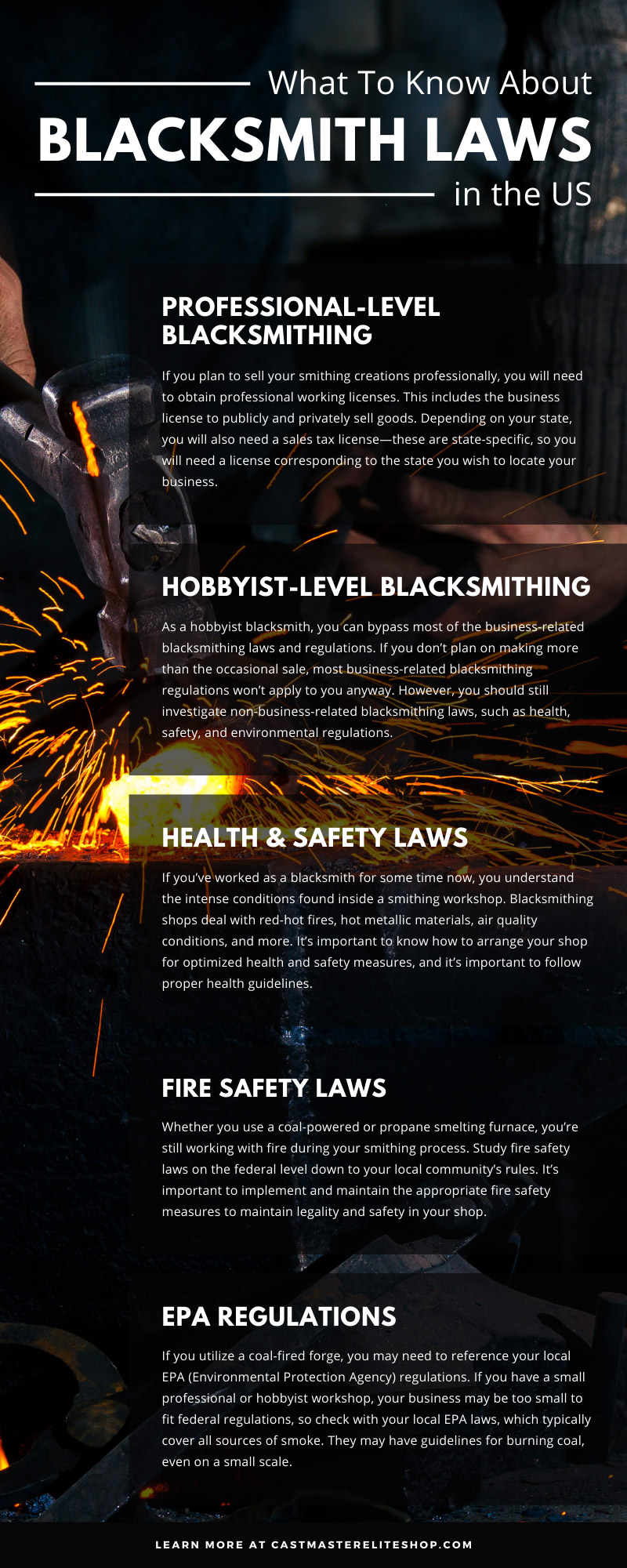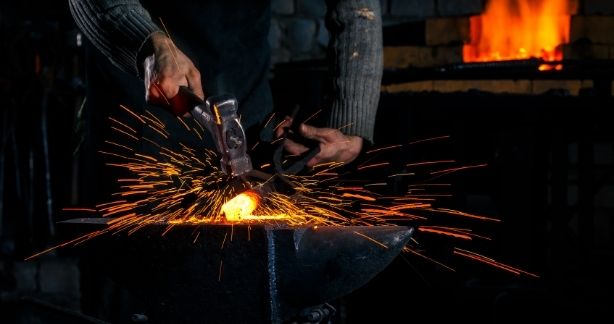Are you planning to set up shop and pursue your love of blacksmithing as a hobby or career? We love the enthusiasm, but pause for just one moment. Before you get started, it’s important to understand the legal side of things that goes into smithing. To ensure that you get started on the right foot, keep reading to understand what to know about blacksmith laws in the US and how they might apply to your workshop. Here is a breakdown of the most important points we will delve into:
- The different levels of legislation
- What laws may apply to professional vs. hobbyist blacksmiths
- Health and safety laws
Levels of Legislation
There are different levels when it comes to any type of legislation in the United States. Your blacksmithing practice may be impacted by different local, state, and federal laws. The laws that pertain to blacksmithing may change depending on where you live or where your business is located. This is why it’s important to know not only the larger federal laws concerning blacksmithing, but also the smaller state and local laws.
Local
Any local laws concerning blacksmithing will cover your city and county. These laws are more specifically tailored to your community than larger state laws, so make sure you look into these before you start smithing. You can find details on local laws and regulations at your local city office, public library, or on your city’s website.
State
Hobbyist and commercial blacksmiths may have to follow different state-level legislation. If you make more than the occasional sale as a hobbyist or professional blacksmith, you may need a business license and a sales tax license to sell your creations. If you decide to sell your creations to the general public, you’ll want to investigate these further. You can find state laws through official online resources for clarification.
Federal
Fortunately, there are no specific federal laws regarding licensing for forging for blacksmithing. While there are no federal laws that pertain specifically to blacksmithing regulations, there are still general federal laws that we must respect. However, there are still many laws that can be applied to blacksmithing on both the hobbyist and professional levels. If you plan on running a blacksmithing business or even picking it up as a hobby, you’ll need to follow these regulations.
Professional-Level Blacksmithing
As mentioned above, if you plan to sell your smithing creations professionally, you will need to obtain professional working licenses. This includes the business license to publicly and privately sell goods. Depending on your state, you will also need a sales tax license—these are state-specific, so you will need a license corresponding to the state you wish to locate your business.
While not all states and aeras require one, you should still double-check the requirements for blacksmithing licensing. Some places in the United States recognize blacksmithing just as any other professional career and may check for qualifications, licensing, and equipment quality.
Hobbyist-Level Blacksmithing
As a hobbyist blacksmith, you can bypass most of the business-related blacksmithing laws and regulations. If you don’t plan on making more than the occasional sale, most business-related blacksmithing regulations won’t apply to you anyway. However, you should still investigate non-business-related blacksmithing laws, such as health, safety, and environmental regulations.
Health & Safety Laws
If you’ve worked as a blacksmith for some time now, you understand the intense conditions found inside a smithing workshop. Blacksmithing shops deal with red-hot fires, hot metallic materials, air quality conditions, and more. It’s important to know how to arrange your shop for optimized health and safety measures, and it’s important to follow proper health guidelines.
If you run a blacksmithing business, you should also consider (and may be required to pick up) business liability insurance. This helps cover any risks, such as injuries, property damage, medical payments, and more. For large-scale blacksmithing companies, having the right insurance plans is crucial due to these extreme working conditions. We can minimize and prevent accidents and injuries, but it’s important to have the proper insurance as a back-up.
In order to keep these accidents to a minimum, it’s important to use proper PPE (personal protective equipment) in your workshop. In fact, the Occupational Safety and Health Administration (OHSA) safety laws require employers to purchase and supply the necessary PPE for all employees. To know what equipment you need to supply, blacksmithing safety equipment usually consists of:
- Safety goggles
- Respirators
- Non-synthetic aprons
- Earplugs or headphones
- Heavy-duty gloves
Fire Safety Laws
Whether you use a coal-powered or propane smelting furnace, you’re still working with fire during your smithing process. Study fire safety laws on the federal level down to your local community’s rules. It’s important to implement and maintain the appropriate fire safety measures to maintain legality and safety in your shop.
There are also open flame ordinances to take note of. Depending on where you do your smithing, you may need an open flame permit to continue working. Open flame rules usually pertain to public spaces, though they can govern private properties as well, especially if there is a risk of fire danger.
EPA Regulations
If you utilize a coal-fired forge, you may need to reference your local EPA (Environmental Protection Agency) regulations. If you have a small professional or hobbyist workshop, your business may be too small to fit federal regulations, so check with your local EPA laws, which typically cover all sources of smoke. They may have guidelines for burning coal, even on a small scale.
Before you set up your blacksmithing equipment and get to work, you must have a grasp of these rules and regulations that apply to you on the federal, state, and local levels. You wouldn’t want to have to uproot your shop because you failed to research first, would you? Now that you understand what to know about blacksmith laws in the US, you can set up shop confidently. Once you’re sure that you have all the proper legislation down, you can get your professional or hobbyist workshop running. Check out Cast Master Elite for all your blacksmithing equipment needs. We can supply you with all the forging, smelting, and smithing equipment you need right here.







